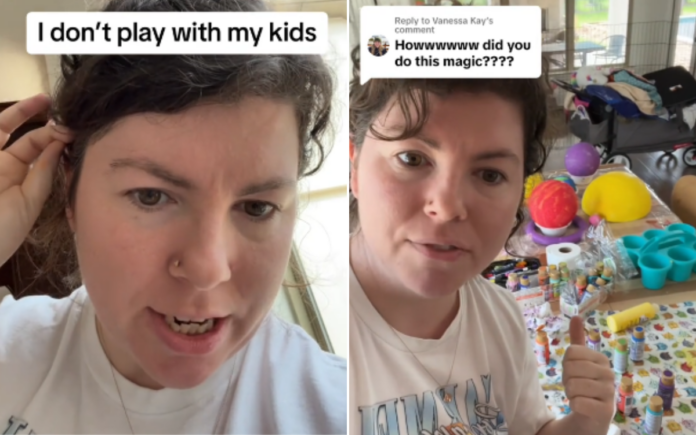A mom-of-two has sparked debate among parents by revealing her secret to a harmonious household: “I don’t play with my kids.”
In a video posted under the handle domesticblisters, KC Davis shared the reason why she’s able to sleep in on a Saturday or go and read a book while her 4 and 6-year-old occupy themselves with independent play. “I just said no to them every single time they asked me to play with them,” Davis explains on the video. “For years. And eventually they stopped asking and just went off and played.”
Independent play is an important part of any child’s development but it’s one that some experts are concerned is not being given enough credence. In 2023, a study published in the Journal of Pediatrics linked a rise in the number of mental health disorders to a decline over several decades in the opportunities given for kids and teens to engage in play and activities without direct oversight from an adult.
Davis is keen to stress on the video that not playing with her kids does not mean she is not engaging with them in fun and creative ways. “What I mean is that I have extricated myself specifically from the role of being my kids’ imaginary play playmate,” she told Newsweek.
“I still interact playfully with them and spend lots of time with them. We snuggle, we tickle, we read, we do arts and crafts, we bake, we go on walks, we tell silly stories, we play games, we build forts, and sometimes we do building toys together. What I don’t do is make believe role play with toys or costumes. I don’t play Barbies, though I’m happy to help you build a Barbie house. I will build a Lego town with my kids but once it’s time for the Paw Patrol figurines to start playing in the Lego town, I step back.”
Davis regularly posts videos offering insights into her parenting style but doesn’t like to call it “parenting advice” but rather “parenting experience.” In this instance, it was Davis’s experience as a mom having her second baby during lockdown that shaped this approach.
“I had already spent the first two years of my older daughter’s life as a stay-at-home mom, dedicating every waking hour to engaging with her, including playing,” she said. “As her imagination blossomed I found it particularly difficult and draining to engage in imaginary and toy play but forced myself to do it because that’s what I thought I was supposed to do.”
Davis said she was “100 percent engaged 90 percent of the time” and “felt guilty” for wanting to even look at her phone or say no to playing with her. However, the sleep deprivation caused by the new baby, coupled with the isolation lockdown created and the fact her husband’s work as a corporate attorney meant he was working most days, led to postpartum depression and chronic fatigue.
“I knew I was on the brink of a psychotic break,” she said. “So I got a therapist, got on meds, and discovered Janet Lansbury.” Lansbury is a leading parenting expert who, as Davis puts it, believes that “play is the job of children” and that adult involvement interrupts as important developmental process.
“She suggested that kids should be encouraged to engage in independent play and parents can focus instead on playfully and responsively engaging our kids during moments of care, like changing diapers, eating a meal, going to the store,” Davis said.
KC Davis
Davis began by setting a 20 minute timer twice a day to engage in “playtime” with her kids. When the time was up, she would sit with her young kids but decline requests to engage in play outside of these times. Over the three years that have followed, Davis believes her family dynamic has improved for the better since her kids learned to play independently.
“I have time to take care of myself and our home, and I feel like I am slowly rediscovering myself as a whole person outside of just a mother,” she said. “I am much more patient with my kids, finding myself genuinely excited and playful with them in those day to day moments like bedtime routines, or mealtimes, or just engaging playfully in the car on the way somewhere. I don’t yell as much, don’t feel as angry, and have been able to emotionally regulate much better than before.”
Despite extolling the virtues of this particular approach, Davis’s video drew criticism from some on TikTok. “Saying ‘they eventually stopped asking…’ like it was a positive thing is WILD,” one user wrote.
“I was an only child and my parents did this to me and it was a LONELY childhood,” a second wrote, with a third adding: “This is absolutely heartbreaking. Some people are not meant to be parents.”
Davis is “not surprised” by the response, noting that the line “I don’t play with kids” was designed to draw people in in the hope that the “nuance” of her approach would then become clear in the video. She’s keen to establish the difference between a neglectful parent and one with boundaries though.
“There is a huge difference in not playing with your kids and ignoring them the rest of the day, and not playing with your kids because you are so burnt out you can’t engage meaningfully in anything,” she said. “A parent that just has boundaries around what types of play they are willing to engage in and is otherwise equipping their kids to use their imagination and develop independence.”
Uncommon Knowledge
Newsweek is committed to challenging conventional wisdom and finding connections in the search for common ground.
Newsweek is committed to challenging conventional wisdom and finding connections in the search for common ground.


